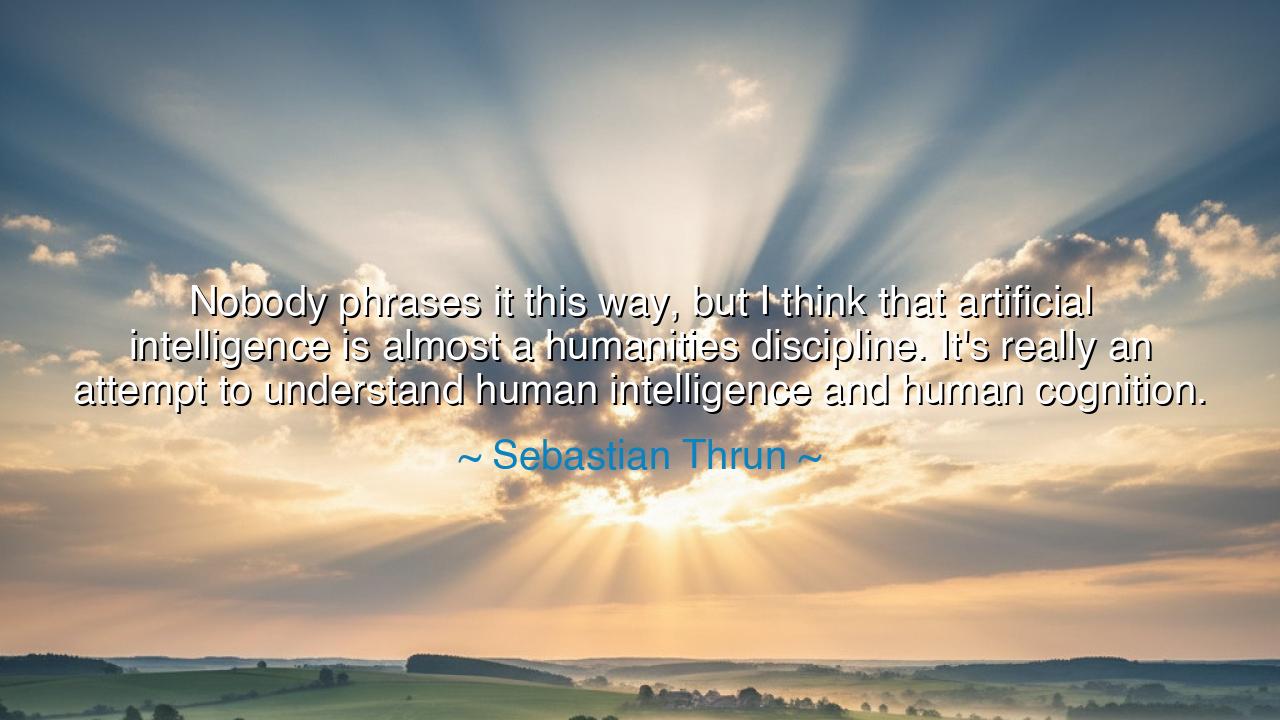
Nobody phrases it this way, but I think that artificial
Nobody phrases it this way, but I think that artificial intelligence is almost a humanities discipline. It's really an attempt to understand human intelligence and human cognition.






“Nobody phrases it this way, but I think that artificial intelligence is almost a humanities discipline. It’s really an attempt to understand human intelligence and human cognition.” Thus spoke Sebastian Thrun, one of the great visionaries of our age — an architect of self-driving cars, a pioneer of online learning, and a seeker at the crossroads of technology and philosophy. In this statement, he reveals a profound and often forgotten truth: that artificial intelligence, though born of mathematics and machinery, is ultimately a mirror held up to the human soul. It is not merely the creation of thinking machines, but a quest to understand the nature of our own thinking, our own essence — the mystery of consciousness that has guided philosophers and poets since time began.
When Thrun calls AI “a humanities discipline,” he reminds us that technology, in its highest form, is not about cold algorithms but about human meaning. It seeks to decode the riddle that has haunted the sages — What is the mind? What makes us perceive, reason, dream, and feel? Every neural network, every line of code, is an echo of that timeless inquiry. For even as we teach machines to learn, we are, in truth, trying to uncover how we ourselves learn. The creation of artificial intelligence is thus a modern mythic journey, akin to Prometheus bringing fire to mankind — a journey not only of invention, but of introspection.
To understand human cognition, one must look beyond the numbers and into the spirit of curiosity that drives them. From the earliest stories of humanity — the clay figures breathed into life by gods, the golems of ancient Jewish legend, the mechanical birds of Daedalus — man has sought to recreate himself through artifice. Each attempt has been both a tribute and a test of human nature. In our age, that ancient dream has taken the form of circuits and silicon, but the longing remains the same: to grasp the secret of what it means to be alive. Artificial intelligence, then, is not the end of humanity’s story — it is one of its deepest reflections.
History offers us a parable in the life of Leonardo da Vinci, the Renaissance master who blurred the line between artist and scientist. His sketches of flying machines, his anatomical drawings, his studies of the human face — all were born from the same impulse that animates AI research today: the desire to comprehend the interplay between creation and creator, between thought and flesh. Leonardo painted the human soul in the eyes of the Mona Lisa, just as modern engineers try to paint the human mind into the code of a machine. Both seek, through their craft, to bridge the gulf between imagination and understanding.
Thrun’s insight reminds us that artificial intelligence is not only an external technology, but an inward mirror. It reveals our values, our biases, our hopes, and our fears. When we train machines to recognize faces or translate languages, we are revealing what we prioritize, what we fear losing, and what we long to preserve. In this sense, AI forces us to confront our own humanity — to ask, If we can replicate thought, what is it that makes us human? Is it reason alone, or the compassion that gives reason purpose? The study of AI, as Thrun says, belongs as much to philosophy as to engineering, for it challenges us to define the very boundaries of the human condition.
Yet with such revelation comes responsibility. For if AI is born from our image, it will reflect both our wisdom and our folly. The ancients knew that to create without reflection was to invite ruin — as in the myth of Icarus, who soared too close to the sun with wings of wax. So too must we temper our innovation with ethics, empathy, and humility. The true purpose of intelligence — whether human or artificial — is not dominance, but understanding; not control, but connection. Thrun’s words, when heard deeply, are a call to wisdom before power, to ensure that what we build mirrors not our flaws, but our highest virtues.
Therefore, let this be your lesson: to study intelligence, whether human or artificial, is to study the self. Approach the rise of technology not with fear, but with reverence. Ask not only what machines can do, but what they teach us about who we are. Let curiosity be guided by conscience; let progress walk hand in hand with philosophy. For as Thrun teaches, every spark of artificial thought is also a light cast upon the mystery of the human soul.
And so, remember: Artificial intelligence is not merely a creation of science, but a continuation of the human story — the eternal quest to know ourselves. If we pursue it with wisdom, it will not replace our humanity, but reveal it more deeply. For in the end, it is not the machine that learns about us, but we who, through the machine, learn to understand ourselves.






AAdministratorAdministrator
Welcome, honored guests. Please leave a comment, we will respond soon